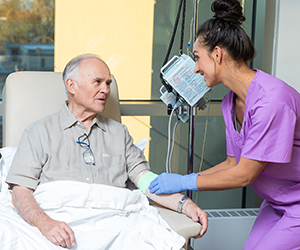Colorectal Cancer: Chemotherapy
Colorectal Cancer: Chemotherapy
What is chemotherapy?

When might chemotherapy be used for colorectal cancer?
Not everyone with colorectal cancer needs chemotherapy, but it is part of the standard treatment for many people. Whether or not you need chemotherapy, and what type of chemo you need, will depend on:
The kind of cancer you have: colon or rectal cancer
The stage of the cancer
The goal of the treatment, such as to shrink a tumor before surgery or to ease symptoms from an advanced cancer
Your age and general health
Concerns you have about side effects
What treatments you have had in the past, if any
Your healthcare provider may advise chemotherapy in any of these cases:
Stage II colon cancer. Chemo is sometimes used for stage II colon cancer as an added treatment after surgery. This is known as adjuvant treatment. But it's not clear if this helps most people. Some people may benefit more than others. Talk with your healthcare provider.
Stage III colon cancer. Chemo is often given as adjuvant treatment after surgery.
Stage IV colon cancer. Chemo is often used by itself as the main treatment. In some cases, it may be used along with surgery.
Stage II or III rectal cancer. Chemo is often given along with radiation before surgery and then again after surgery.
Stage IV rectal cancer. Chemo may be used by itself. In some cases, it may be used or with surgery or radiation therapy.
Return of cancer after treatment. Chemo may be used if your colon or rectal cancer has come back after initial treatment.
How is chemotherapy given for colorectal cancer?
Before treatment starts, you will meet with a medical oncologist. This is a doctor who treats cancer with medicines. The doctor will discuss your treatment options with you and explain what you might expect.
You may get chemo medicine in 1 of these ways:
IV (intravenous). The medicine is given through a small needle that has been put into a vein. The medicine may drip in slowly over several hours or even days, or it may be given more quickly over a few minutes. When chemotherapy is given over days, people often go home with a small infusion pump. This is a bag that looks a waist pack. It is disconnected later. Chemotherapy may also be given directly into an artery leading to a part of the body containing the tumor.
Oral. You swallow these medicines as pills.
Chemotherapy is most often given as an outpatient treatment. That means that you get it at a hospital, clinic, or healthcare provider's office. You can go home the same day, after the treatment. In some cases, you may need to stay in the hospital during treatment. This is inpatient treatment. You'll be watched for any reactions during your treatments.
Chemotherapy is given in cycles over a period of time. That means you have treatment days followed by rest periods. Each period of treatment and rest is 1 cycle. You may have several cycles. Your healthcare provider will discuss your chemo schedule with you.
Types of chemotherapy medicine
The chemotherapy medicines most often used for colorectal cancer include:
Fluorouracil (5-FU)
Capecitabine
Irinotecan
Oxaliplatin
Trifluridine and tipiracil
Often 2 or 3 of these medicines are combined. They might also be given along with other medicines called targeted therapies.
Chemotherapy side effects
Side effects of chemotherapy depend on the type and amount of medicine you’re taking. They vary from person to person. Talk with your healthcare providers about what to expect. When your treatment has ended, the side effects usually go away. You may also be able to help control some of these side effects. Tell your healthcare providers about any side effects you have. They can help you cope with them.
Some common side effects from chemotherapy for colorectal cancer include:
Diarrhea
Infection
Nausea and vomiting
Mouth sores
Bleeding and bruising more easily
Fatigue
Some side effects are seen more often with certain chemotherapy medicines. For example:
Capecitabine can cause hand-foot syndrome. This causes redness, pain, and sometimes blisters or open sores on the hands and feet.
Oxaliplatin can cause nerve damage. This can lead to pain, tingling, and numbness in the hands and feet.
Working with your healthcare team
It's important to know which medicines you're taking. Write your medicines down, and ask your healthcare team how they work and what side effects they might have.
Talk with your healthcare team about what signs to look for and when to call them. For example, chemo can make you more likely to get infections. Make sure you know what number to call with questions. Ask if there is a different number for evenings and weekends.
It may be helpful to keep a diary of your side effects. A written list will make it easier for you to remember your questions when you go to your appointments. It will also make it easier for you to work with your healthcare team to make a plan to manage your side effects.
Updated:
February 22, 2018
Reviewed By:
Alteri, Rick MD,Gersten, Todd, MD,Image reviewed by StayWell art team.